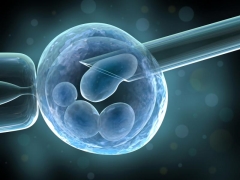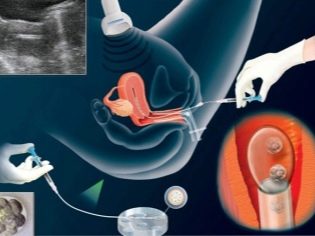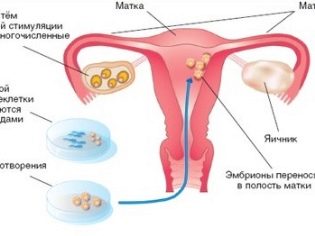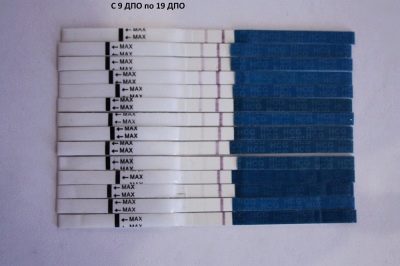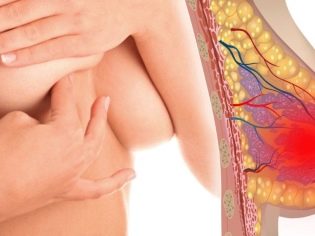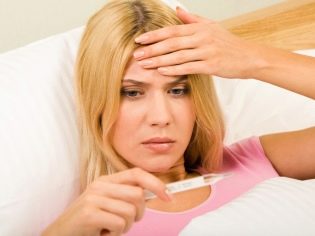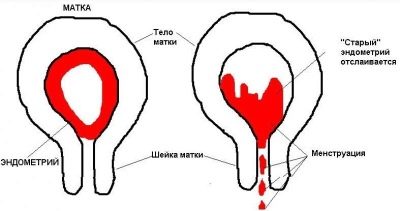Why after menstruation may appear?
After embryo replanting in the IVF protocol, the woman “listens” to her body with particular anxiety, notes any changes, and hopes that the pregnancy has occurred. But sometimes after some time after grafting begin monthly. What they say, we will tell in this article.
What happens after the transfer?
After transfer of fertilized eggs that have reached a certain age, measured in days after fertilization to the uterus, In a woman's body, events can develop in three scenarios:
- the embryo will take root, will be able to penetrate the epithelium and continue to develop - pregnancy will come;
- the ovum will take root, implant, but after a while it will be rejected by the mother's body or stop developing - the pregnancy will be interrupted at the earliest terms;
- the ovum fails to implant and perishes - pregnancy will not come.
If the implantation is successful, the chorionic villi, which fetal membranes and attached to the wall of the uterus, will begin to produce a special substance - human chorionic gonadotropin, whose concentration will increase approximately twice in blood and urine. If not one but two embryos take root, the content of this hormone will be exactly twice as high as the established norms.
Approximately two weeks after the transfer and successful implantation, HCG will begin to be determined in the blood plasma and in the urine. This will be the main diagnostic sign of a successful protocol - a woman can be congratulated on the occurrence of pregnancy.
If the implantation does not occur - the growth of hCG is not observed, and if the pregnancy is interrupted, the concentration of chorionic gonadotropic hormone will be significantly below the norm.
Bleeding
With successful IVF and the onset of pregnancy, periods after the protocol should not begin. As with natural conception, the absence of menstruation is an indirect symptom of pregnancy. However, small bleeding after replanting may well be considered the norm.
Firstly, they are associated with hormonal stimulation of superovulation, which was carried out in the first phase of the cycle before the collection of eggs, and secondly, they may be a sign of a reaction to the hormonal support accompanying the second phase of the cycle. Doctors recommend not to be nervous and calm down, if the discharge is not painful, not abundant, not accompanied by other unpleasant symptoms and are in the nature of “smear”.
Within two weeks after the transfer of embryos into the uterine cavity of a woman, such secretions may well be the norm. You need to be wary in the event that bleeding increases, does not stop 14 days after transplantation, and also begins to be accompanied by pain.
First of all, the woman herself should be able to determine what the nature of the discharge is and whether they are similar to menstruation.
Types of discharge
A positive sign can be a selection that begins after three days from the time of embryo grafting. They can talk about the successful implantation of the latter into the endometrium of the uterus. Such bleeding is called implant bleeding. It is associated with a violation of the integrity of the endometrium at the time of the introduction into it of the ovum.
Implant bleeding can manifest as a few drops of blood on a daily strip or pinkish "daub."The excretions may also be brown or beige, but they must be scanty. Abundant discharge during implantation should not be!
In addition to such secretions that cannot be considered monthly, during implantation, a woman may experience breast engorgement, increased sensitivity, a slight increase in body temperature, especially in the afternoon and evening, as well as increased irritability and emotional instability. There is usually no pain. Only sometimes women notice that they slightly pulls and hurts the stomach, as before menstruation.
That is why implantation bleeding is often confused with the onset of menstruation. Unlike menstruation, implantation bleeding is not inclined to change the intensity, it does not become more abundant, the discharge does not contain clots and bright red blood. It usually lasts from several hours to several days and disappears before the date of the next menstruation.
It should be noted that implantation bleeding is not peculiar to everyone and does not always appear, therefore, it is not worth waiting for it. Quite often, implantation proceeds without pronounced symptoms, discharge and sensations.
Full menstruation after the "transit" IVF will not. Most often, the discharge is accompanied by a pulling pain in the lower abdomen, there are numerous blood clots in the discharge, but the menses themselves last a little less than usual - 3-4 days instead of 5-6 usual ones. Sometimes menstrual periods after unsuccessful IVF are longer than usual, but not more than 1-2 days.
Almost all women note that after a failed IVF attempt, menstruation is more painful than usual, the color of the discharge is more scarlet. These are the effects of hormone therapy, and it will pass during subsequent periods The onset of menstruation at a time appropriate for the cycle indicates the onset of menstrual bleeding, in which the uterus of a woman gets rid of dead ungraded embryos and excess endometrium, which was “increased” by hormones in the first half of the cycle.
The onset of bleeding after a delay, as well as a positive pregnancy test, may indicate a threatened miscarriage, a beginning or completed miscarriage. It is imperative to visit a doctor or call an ambulance to diagnose the disorder and, if possible, try to keep the pregnancy.
With successful implantation, discharge may begin due to a lack of progesterone, which must regulate the multiple processes of ensuring pregnancy in the early stages in the female body. For protocols with stimulation, supportive progesterone therapy after transplantation is usually prescribed. With protocols in the natural cycle, doctors try to do without drug support.
Sometimes this approach requires correction and the appointment of progesterone in certain doses from the very beginning of pregnancy up to 12-14 weeks, when the risk of miscarriage is considered less likely.
Causes of menstruation after the procedure
The reasons for which come monthly after in vitro fertilization, can be different - from violations of doctor's recommendations to inflammatory diseases, stress and even infection. When entering into the IVF protocol, a woman is usually warned that no one can guarantee pregnancy with a 100% probability. Provided that a woman is not 35 years old and her health condition does not cause anxiety at the doctor, the probability of pregnancy is estimated at 35-45%. This means that more than half of women after an IVF attempt will inevitably begin menstruation.
The probability of implantation and development of embryos decreases with the age of a woman: up to 35 years old - the chances are above 40%, after 40 years they drop to 8%. The effect of hormonal stimulation of the ovaries, which was necessary for the production of eggs, can also be the cause of unsuccessful IVF.
Strong stress, which is exposed to a woman who is in the IVF protocol, is also not conducive to a successful beginning of pregnancy.
Embryos could be of insufficient quality, which prevented their implantation and development. The reason for the lack of implantation can be endometriosis, fibroids, hydrosalpinx (fluid accumulation in the fallopian tubes), as well as a rather impressive list of female diseases, which also prevents pregnancy.
Under the action of hormones, the woman's body is in shock. It may exacerbate chronic diseases, as well as infection with influenza, SARS or any other infection after embryo replanting. It is not at all necessary that the woman immediately starts to hurt badly, sometimes the symptoms of infections are quite subtle but have a detrimental effect on the embryos.
Overweight, obesity women can also cause the arrival of menstruation after IVF. Sometimes the reason lies in the genetic incompatibility of partners.
Therefore, a genetics compatibility analysis is best done in advance, before joining the first protocol, since with such incompatibility, none of the attempts from these partners will succeed.
Experiences and stress, tears and excitement, quarrels with relatives after embryo replanting contribute to the production of stress hormones, which suppresses the production of progesterone, which is so necessary for a successful pregnancy and its preservation. And bad habits (smoking, alcohol), if a woman cannot part with them after a replant in an IVF protocol, can reduce all the efforts of doctors.
Non-observance of medical recommendations is a reason rather rare, because women who went to IVF usually value the chance of pregnancy, because it is long-awaited and desirable for them. Sometimes violations occur unknowingly that steaming in the bath, going to the sauna, basking in the hot bath, loading yourself in the gym and having sex after replanting embryos is prohibited.
What to do?
If atypical bleeding occurs after IVF, you should definitely get a qualified medical consultation that will help establish whether it is menstruating or the risk of miscarriage.
If they came full monthly, pregnancy did not come, do not worry and despair. According to statistics, the second and third protocols are usually much more successful than the first. And some women even have to postpone 8-9 attempts before they see the cherished two strips or the positive results of the blood test for hCG.
In addition, there is a 25% chance that after an unsuccessful IVF attempt, pregnancy may occur in a completely natural way in bed, and not in a laboratory test tube. The fact is that hormonal therapy gives a powerful impetus to the female reproductive system.
If the cause of her infertility was not identified, endocrine, associated with violations of the cycle, it is the IVF protocol itself that can put everything in its place. Every fourth pair in such circumstances, it is possible to conceive a baby on their own after an unsuccessful attempt in the next 1-2 months.
If the cause of infertility is unremovable, there is no need to despair either. After the end of the month it is important to be examined, find the cause of the failure and try again when the doctor allows.
About what a woman needs to know after embryo transfer, see the next video.
